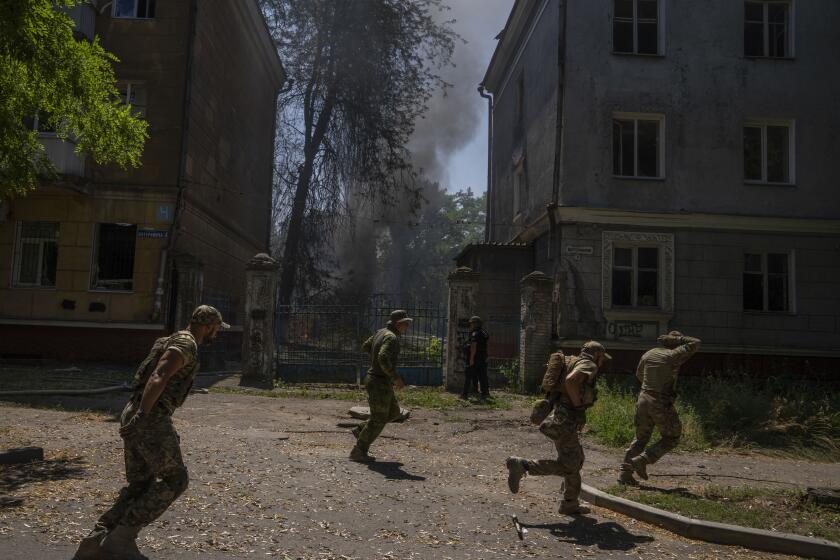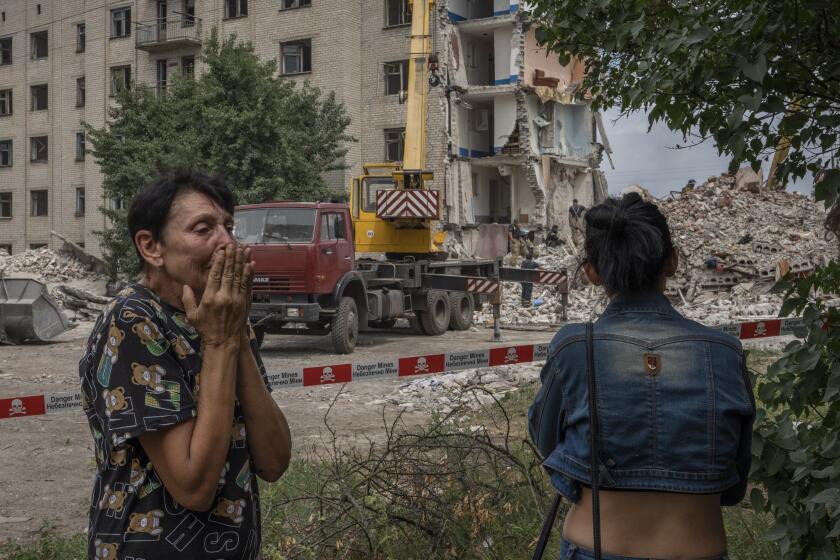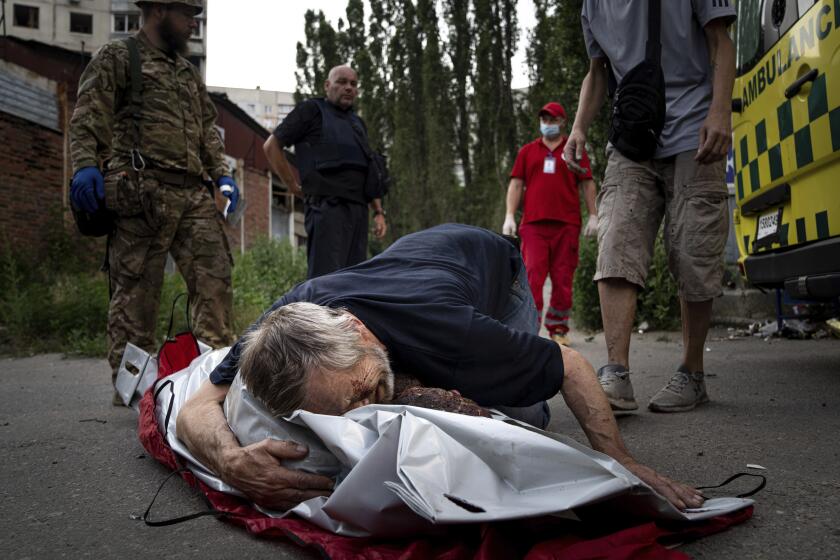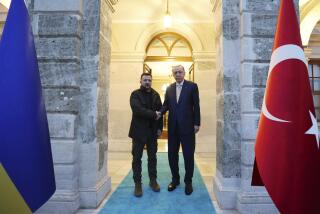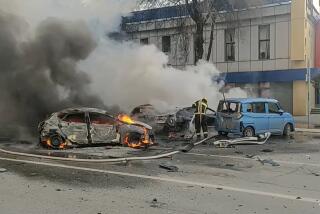Ukraine and Russia make progress in talks on grain exports, U.N. says
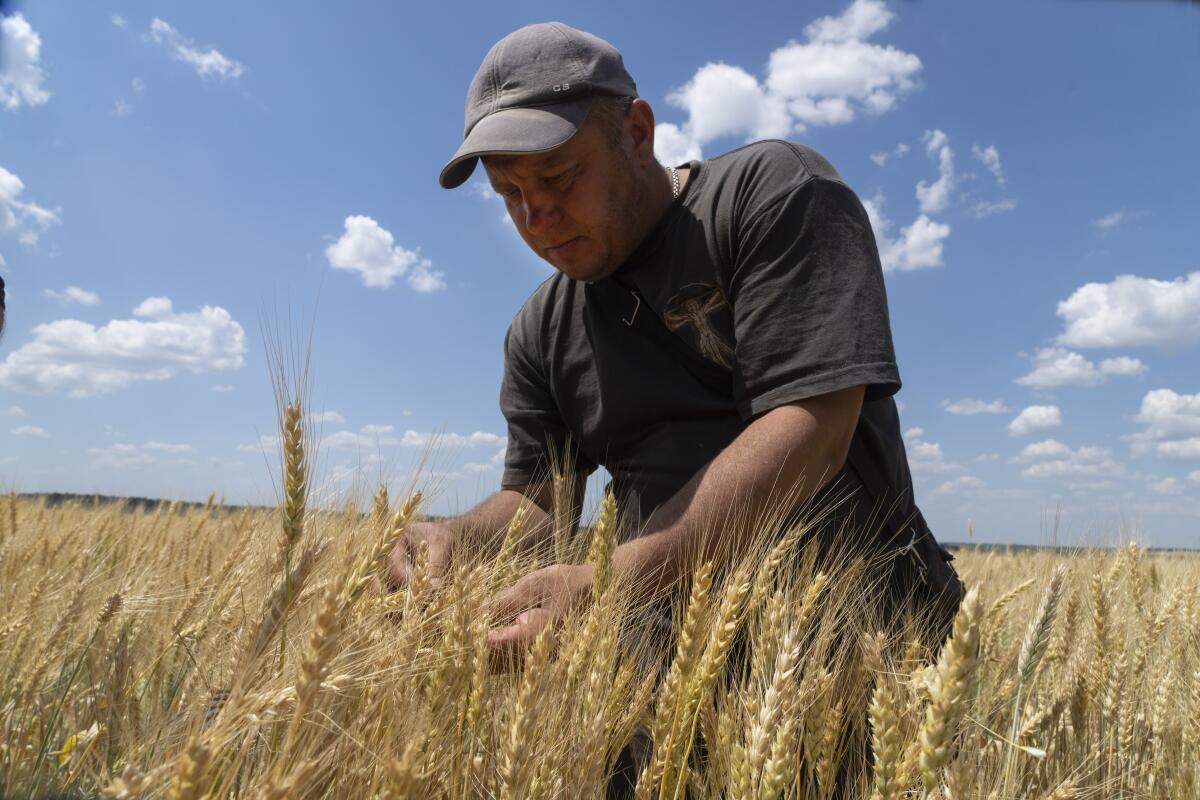
ISTANBUL — United Nations Secretary-General Antonio Guterres said the first meeting in weeks between Russia and Ukraine took “a critical step” forward Wednesday to ensuring the export of desperately needed grain from Ukraine’s Black Sea ports to help ease the global food crisis.
Turkey’s defense minister said agreements would be signed when negotiators meet again in Istanbul next week.
The U.N. chief cautioned that “more technical work will now be needed” to reach an agreement, “but the momentum is clear … I’m encouraged. I’m optimistic, but it’s not yet fully done.”
With the war in Ukraine in its fifth month and much of the world seeing food prices soar and millions in developing countries facing hunger and possible starvation, getting grain and fertilizer shipments moving again from two of the world’s major exporters is crucial.
Guterres proposed a package deal in early June to unblock shipments of Ukrainian wheat and other food crops from the Black Sea and lift restrictions on Russia’s exports of grain and fertilizer. He was tight-lipped about progress — until Wednesday.
The U.N. chief spoke in New York, hours after military officials from Russia, Ukraine and Turkey met with U.N. humanitarian chief Martin Griffiths in Istanbul to discuss stumbling blocks to a deal, mainly on how to ship about 22 million tons of grain stuck in Ukraine because of the war.
Turkish Defense Minister Hulusi Akar said the sides reached agreement concerning the “joint control” of vessels as they leave and arrive at Black Sea ports to pick up grain, and the safety of the transfer routes. A coordination center would be established in Istanbul and would include U.N., Turkish, Russian and Ukrainian officials, he said.
Turkey has retained close ties to both Russia and Ukraine and has worked with both countries and the U.N. to reach an agreement. It has offered to provide safe Black Sea corridors.
Akar said the talks were held in a constructive atmosphere. “We see that the parties are willing to solve this problem,” he said, forecasting agreements next week.
A huge blast caught on social media was the result of a Ukrainian strike on a Russian ammunition depot in occupied territory, Ukrainian officials said.
Ukrainian President Volodymyr Zelensky said his country’s delegates at the talks had informed him that they were making progress.
He said he was grateful to the United Nations and Turkey for their efforts to restore Ukraine’s agricultural exports. “If they succeed in removing the Russian threat to shipping in the Black Sea, it will reduce the severity of the global food crisis,” Zelensky said in his nightly video address.
Russia said it had presented a package of proposals for a “practical and quick solution” to unblock the export of Ukrainian grain but did not elaborate.
Guterres said there was “very substantive progress and I would say broad agreement” Wednesday on how to ensure the safe export of Ukrainian food products through the Black Sea. Now, he said, there is “a ray of hope to ease human suffering and alleviate hunger around the world” and bring “much-needed stability to the global food system.”
Russian assaults on Ukraine’s second-largest city, Kharkiv, kill at least three people and injure scores more, including children, official says.
He cited “substantive agreement on many aspects” related to the control of shipping, coordination of the operation and de-mining of the Black Sea.
He said the U.N., Russia, Ukraine and Turkey will work together to ensure that an agreement is implemented effectively.
Experts have cautioned that an agreement will not have an immediate impact. It will take time to ensure there are no mines in the Black Sea shipping channel, and then to get cargo ships to Odesa, Ukraine’s largest Black Sea port. Inspections will have to be done and arrangements made for shipping out the 22 million tons of grain that Ukraine’s president says are now in silos.
A wife and mother is killed in her courtyard during Russian shelling. Her husband won’t let go of the body.
U.N., Turkish and other officials are scrambling for a solution that would empty the silos in time for the upcoming harvest in Ukraine. Some grain is now being transported through Europe by rail, road and river, but the amount is small compared with the volume on Black Sea routes.
The U.N. Food and Agriculture Organization says the war in Ukraine is endangering food supplies for many developing nations and could worsen hunger for up to 181 million people.
Ukraine is one of the world’s largest exporters of wheat, corn and sunflower oil, but Russia’s invasion and war have disrupted production and halted shipments across the Black Sea to the Mediterranean.
Before the talks, Ukrainian Foreign Minister Dmytro Kuleba told the Associated Press that grain exports from his country’s ports would not resume without security guarantees to ship and cargo owners, and to Ukraine’s status as an independent nation.
Any agreement needs to ensure that Russia “will respect these corridors, they will not sneak into the harbor and attack ports or that they will not attack ports from the air with their missiles,” he said.
Russian and Ukrainian officials have traded accusations over the stuck grain shipments.
Moscow claims Ukraine’s heavily mined ports are causing the delay. Russian President Vladimir Putin has pledged that Moscow would not use the corridors to launch an attack, if the sea mines were removed.
But Ukrainian officials have blamed a Russian naval blockade for holding up the exports and causing the global food crisis. They are skeptical of Putin’s pledge to not take advantage of cleared Black Sea corridors to mount attacks on Ukrainian ports, noting that he insisted repeatedly this year that he had no plans to invade Ukraine.
Ahead of the talks, Pyotr Ilyichev, head of the Russian Foreign Ministry’s department for ties with international organizations, said Russia’s military had repeatedly declared its willingness to allow safe shipping corridors in the Black Sea.
Seventy vessels from 16 countries have remained stuck in Ukrainian ports, Ilyichev said, alleging that Ukrainian authorities had barred them from departing.
“Our conditions are clear: We need to have a way to control and check the ships to prevent any attempts to smuggle weapons in, and Kyiv must refrain from any provocations,” Russia’s Interfax news agency quoted Ilyichev as saying.
Western sanctions on Russia do not ban exports of food or fertilizer. But Moscow argues that Western sanctions on its banking and shipping industries make it impossible for Russia to export those goods and are scaring off foreign shipping companies.
“We still need a lot of goodwill and commitments by all parties,” Guterres said. “In the end, the aim of all parties is not just an agreement between the Russian Federation and Ukraine but an agreement for the world.”
More to Read
Sign up for Essential California
The most important California stories and recommendations in your inbox every morning.
You may occasionally receive promotional content from the Los Angeles Times.
